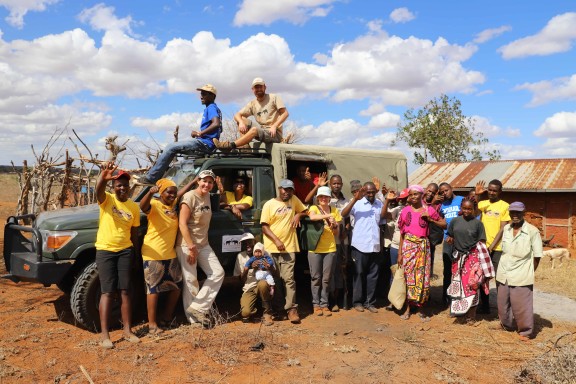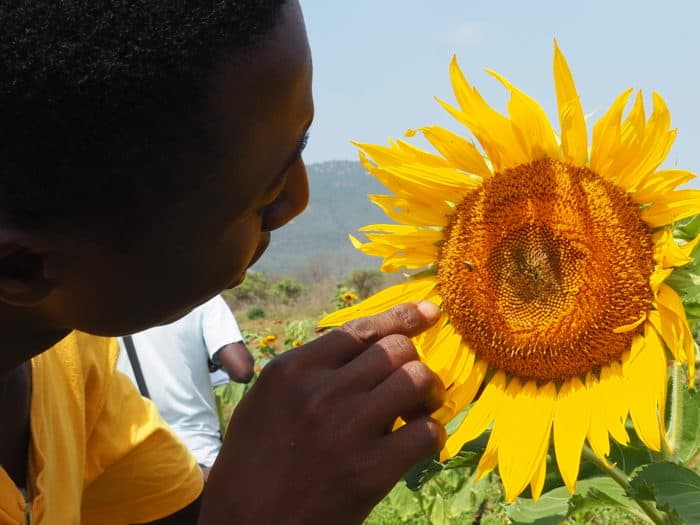
Dr King (aka Lucy) is a fellow African who grew up in Somalia, Lesotho and Kenya and who shares ROAR AFRICA’s passion for Africa’s wild spaces. As the head of the Human-Elephant Co-Existence Program for the research charity Save The Elephants and a Research Associate to the University of Oxford, Lucy is credited with a ground-breaking discovery that has reduced human-elephant conflict by a staggering 80% in the communities she works with, next to Tsavo East National Park in Kenya.
The reasons for human-elephant conflict are many. Catastrophic poaching has seen the population crash from over a million elephants just 40 years ago, to 400,000 today. While an effective international ivory trade ban has resulted in the numbers of elephants rising, particularly in East and Southern Africa, these elephants are now expanding into a world densely populated with people. ‘The African elephant is the most iconic migratory land mammal in the world,’ explains Lucy. ‘Rising incidents of human-elephant conflict are occurring where elephants are exploring old migratory routes that have either been blocked by new developments or where they are breaking into farmland plots to take advantage of nutritional agricultural produce.’ This is exacerbated by the fact that elephants tend to crop-raid at night time, and farmers confronting elephants in the dark are often left with no choice but to throw stones and fire crackers or shoot bullets into the air to try to scare them away. This kind of confrontation inevitably leads to heightened aggression where elephants will charge and attack. It was these factors that led Lucy to design her ground-breaking beehive fence, best described as a boundary of poles with beehives on them that are interlinked via wire, so as to capitalize on elephants natural aversion to bees. The result? The effective protection of community crops whilst providing a pollination service for the farmers and creating income via the elephant-friendly honey produced as a result.
Lucy’s initial research focused on Kenyan folklore and the anecdotal accounts she’d heard about bees and their effect on the movement of elephants. This was validated when she began combining established assessment techniques, such as dung counts, and bee-keeping with novel research techniques like sound replays and video-analysis. ‘I discovered that bees tend to sting an elephant around its eyes and head and release a pheromone that attracts other bees to the area.’ So much so, that the mere playing of a recording of the sound of swarming bees would result in the family moving immediately from the area. Such was the importance of her discovery – first made as part of her research for her Masters Degree in Science in 2005. A year later she put her plan into action during her postdoctoral research when she founded the Elephants and Bees Project in collaboration with Oxford University and Disney’s Animal Kingdom. ‘Our thinking then as now was that by interconnecting the hives, we’d be able to form a barrier so that if elephants tried to enter the area, the wires that connect all the beehives would move and unleash a furious swarm of bees that would send the family on their way.’
Since its inception the Elephants and Bees Projects has installed over 1,500 hives in Kenya alone while a total of 7,000 hives now exist on 14 sites in Africa. Lucy’s latest success is finding the funding for a mobile unit that will take the beehive fence project to other communities. ‘We keep in touch with some 60 sites around the world who are trying the idea out,’ she adds. Collaborating with many organizations such as The Tsavo Trust, Maasai Wilderness Conservation Trust and the Kenya Wildlife Service, Lucy and her team are making a profound difference.
Not one to rest on her laurels, Lucy is looking at other ways in which their growing infrastructure can support and encourage less conflict and more nutritional and sustainable farming methods. ‘We are on a major mission to wean high-conflict farmers off maize, even if we can reduce it to 50% of their farms,’ she says. ‘Our aim is to encourage the introduction of alternative high value crops that provide pollen and nectar for bees and a variation in nutrition for farmers.’ For Lucy and her team at Elephants and Bees, the perfect crops are those that are drought resistant, provide food for bees and that can be eaten by humans, not elephants! ‘It’s pretty tricky,’ she laughs. ‘But at the moment we are focusing on sunflowers as a magic Human-Elephant reduction crop and we’re looking into several others that fit this category too.’

Lucy’s passion for elephant conservation has been applauded the world over, not only was she awarded the UNEP/CMS Thesis Award in 2011 from the United Nations Environment Program’s Convention on the Conservation of Migratory Species but she also won The Future for Nature Award and The St Andrews Prize for the Environment in 2013. We are thrilled to have Lucy as one of our keynote speakers at our Women’s Empowerment: ROAR & RESTORE trip, that will take place this year from June 11-17 in South Africa. If you’d like to hear Lucy speak about her life’s work or if you want more information on this incredible all-female journey, email welcome@roarafrica.com



